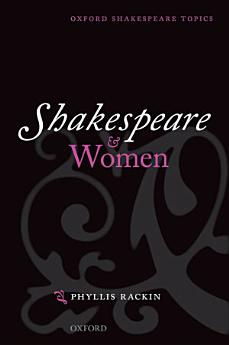Shakespeare and Women
Phyllis Rackin
2005. g. maijs · OUP Oxford
E-grāmata
180
Lappuses
family_home
Piemērota
info
reportAtsauksmes un vērtējumi nav pārbaudīti. Uzzināt vairāk
Par šo e-grāmatu
Shakespeare and Women situates Shakespeare's female characters in multiple historical contexts, ranging from the early modern England in which they originated to the contemporary Western world in which our own encounters with them are staged. In so doing, this book seeks to challenge currently prevalent views of Shakespeare's women-both the women he depicted in his plays and the women he encountered in the world he inhabited. Chapter 1, 'A Usable History', analyses the implications and consequences of the emphasis on patriarchal power, male misogyny, and women's oppression that has dominated recent feminist Shakespeare scholarship, while subsequent chapters propose alternative models for feminist analysis. Chapter 2, 'The Place(s) of Women in Shakespeare's World', emphasizes the frequently overlooked kinds of social, political, and economic agency exercised by the women Shakespeare would have known in both Stratford and London. Chapter 3, 'Our Canon, Ourselves', addresses the implications of the modern popularity of plays such as The Taming of the Shrew which seem to endorse women's subjugation, arguing that the plays-and the aspects of those plays-that we have chosen to emphasize tell us more about our own assumptions than about the beliefs that informed the responses of Shakespeare's first audiences. Chapter 4, 'Boys will be Girls', explores the consequences for women of the use of male actors to play women's roles. Chapter 5, 'The Lady's Reeking Breath', turns to the sonnets, the texts that seem most resistant to feminist appropriation, to argue that Shakespeare's rewriting of the idealized Petrarchan lady anticipates modern feminist critiques of the essential misogyny of the Petrarchan tradition. The final chapter, 'Shakespeare's Timeless Women', surveys the implication of Shakespeare's female characters in the process of historical change, as they have been repeatedly updated to conform to changing conceptions of women's nature and women's social roles, serving in ever-changing guises as models of an unchanging, universal female nature.
Par autoru
Professor Phyllis Rackin has taught Shakespeare at the University of Pennsylvania for forty years. A former President of the Shakespeare Association of America, she has published three books on Shakespeare as well as numerous scholarly articles on Shakespeare and related subjects in anthologies and in such journals as PMLA, Shakespeare Quarterly, and Shakespeare-Jahrbuch. Her awards include an ACLS fellowship and a Lindback award for distinguished teaching.
Novērtējiet šo e-grāmatu
Izsakiet savu viedokli!
Informācija lasīšanai
Viedtālruņi un planšetdatori
Instalējiet lietotni Google Play grāmatas Android ierīcēm un iPad planšetdatoriem/iPhone tālruņiem. Lietotne tiks automātiski sinhronizēta ar jūsu kontu un ļaus lasīt saturu tiešsaistē vai bezsaistē neatkarīgi no jūsu atrašanās vietas.
Klēpjdatori un galddatori
Varat klausīties pakalpojumā Google Play iegādātās audiogrāmatas, izmantojot datora tīmekļa pārlūkprogrammu.
E-lasītāji un citas ierīces
Lai lasītu grāmatas tādās elektroniskās tintes ierīcēs kā Kobo e-lasītāji, nepieciešams lejupielādēt failu un pārsūtīt to uz savu ierīci. Izpildiet palīdzības centrā sniegtos detalizētos norādījumus, lai pārsūtītu failus uz atbalstītiem e-lasītājiem.







